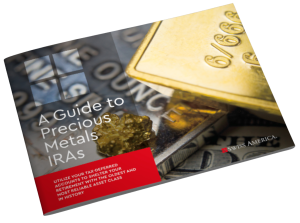
There was a period of about 41 years when US citizens couldn’t legally own gold. That’s no longer the case, so the question is, how much gold can you own? What are the rules about gold investing? And tax impacts you should know?
Today, you can own as much gold as you want. There are rules around taxes and transaction reporting, but there are zero legal restrictions to follow if you decide to buy gold.
This article gives you the history and some of the common questions people have about owning and holding gold.
Private gold ownership in the United States
Gold is one of the most popular tangible investments. For anyone who wants to diversify outside the stock market and own something physical they can fully control, there’s nothing quite like gold.
When you look at other options outside of the stock market, real estate takes a lot of work, collectibles are very speculative, and the hot investment of the past year, Bitcoin, isn’t even physical, and it’s at risk for cyber attacks or digital glitches.
Historically, the government created laws that impacted how much gold citizens could own. Here’s what happened:
Executive Order 6102 and the Gold Reserve Act
In 1933, President Franklin D. Roosevelt signed Executive Order 6102, which prohibited individual gold ownership in the U.S. The order directed citizens to deliver gold coins, bullion, and gold certificates to the Federal Reserve.
The following year, the Gold Reserve Act created a monetary policy to manipulate the price of gold. It included establishing a set price per ounce of $35, which devalued the U.S. dollar. The Act also established the Exchange Stabilization Fund (ESF) under Treasury control to manipulate the money supply and stabilize the dollar without Federal Reserve involvement.
Private ownership of gold became heavily restricted, and laws included penalties for owning gold.
Repeal of the gold ban in 1974
The U.S. removed the ban on private gold ownership in 1975, making it completely legal for individuals to own gold when President Gerald Ford signed Public Law 93-373.
National emergencies
Even though there are no federal laws imposing a cap on the amount of gold an individual can own or buy, the government can still put limits in place if it chooses. In a national emergency, the government has the legal authority to invoke measures similar to Executive Order 6102.
Gold IRA option in 1997
It’s also important to note that the Taxpayer Relief Act of 1997 made it possible to own precious metals inside an IRA. Gold can be held in this self-directed Individual Retirement Account (IRA), but it must meet specific purity standards and be stored with an IRS-approved depository.
The overall structure works the same as any regular IRA. You can have a traditional IRA with pre-tax contributions or a Roth Gold IRA with after-tax contributions, and the IRS has specific rules you need to follow.
Legal requirements for physical gold ownership
Here’s a quick at-a-glance of the legal requirements for owning gold in the U.S.:
| Rule | What it means |
|---|---|
| Legal limit | No cap on how much gold you can own |
| Reporting | Dealers report cash buys over $10,000 via Form 8300 |
| Taxes | Long-term gains on gold taxed up to 28% |
| Storage | Home, bank safe deposit box, or depository |
| IRA rules | Must meet purity standards and be stored with a custodian |
Specific to restrictions, the only legal requirements that you need to know about owning gold are the tax implications and possible money laundering rules.
Anti-money laundering laws like the Bank Secrecy Act and the USA Patriot Act have gold dealer reporting requirements if you buy $10,000 or more in gold coins or bars.
In those scenarios, the dealer has to report the transaction to the government via IRS Form 8300. They’ll ask you for identification and also confirm the source of funds.
Tax compliance is a deeper topic, so we’ll cover that next.
Tax requirements for physical gold ownership
The tax implications basically fall into three categories:
- Sales taxes: All gold investments are subject to taxes upon sale. However, depending on where you live, you may not have to pay state or local sales tax on gold.
- Capital gains: If you own gold outside of your IRA and you make a profit when you sell, you’ll pay capital gains tax. Long-term capital gains on gold are taxed at a maximum rate of 28%, which is higher than the rate for stocks and bonds.
- Gold IRAs: If you take money out of any retirement account before age 59½, you’ll face penalties. And if you have a traditional Gold IRA, you also owe income tax on withdrawals and later have required minimum distributions (RMDs).
Always keep good records of gold purchases and sales to prepare for tax time and possible audits.
Buying gold
It can be kind of confusing if you’re looking to buy gold for the first time. The main options include:
- Paper gold assets: These are digital gold investments like exchange-traded funds, mining stocks, or mutual funds. None of these gives you tangible ownership.
- Physical gold: Physical investment-grade gold is also called bullion. This refers to gold bars and coins made specifically for investing. They meet certain purity and quality standards and come from specific mints and manufacturers that follow these standards.
Gold storage and security
Since gold is a tangible asset, you’ll need to think about where you’re going to store it and how to protect it. There are three ways that we see people handle this:
- Home safe: You can keep your gold at home in a safe that gives you access anytime you want. Home storage of gold allows for ready access and complete control, but it has risks like theft and damage. Home insurance policies usually don’t cover precious metals unless you buy an additional rider.
- Bank safe deposit box: This can be an inexpensive option that’s secure, but the FDIC doesn’t insure the contents of a safe deposit box, so you’ll need to buy extra insurance to cover your metals.
- Precious metals depository: This specialized vault storage offers better protection than home storage, with additional security such as climate control and armed guards. It also includes insurance as part of their storage fees.
International gold ownership
Rules regarding the ownership of gold outside the United States vary from country to country. A few examples of how other countries look at gold ownership include:
- India: India has specific limits on how much physical gold individuals can legally possess based on gender and marital status.
- Singapore and Switzerland: Both countries are considered gold-friendly, with fewer restrictions. Singapore highly encourages gold ownership with tax exemptions for bullion coins or bars under the country’s Investment Precious Metals (IPM) Scheme.
- United Kingdom: No restrictions on gold ownership.
Generally, you’ll find that each country has import duties, customs declarations, and taxes on gold.
Estate planning
You also want to consider your plans for passing on your gold to heirs. You can include your gold investments in your trust or will. There are different tax impacts:
- Federal estate tax: In 2026, if the estate is less than $15 million per person, the heir usually doesn’t have to pay taxes.
- State inheritance tax: Some states may have inheritance or capital gains taxes so you’ll want to check the laws and consult with a tax professional.
- Capital gains: For inherited gold, capital gains tax only applies to appreciation after inheritance if the beneficiaries sell the gold. When they do, the IRS treats it as long-term capital gains, which has a current max rate of up to 28%.
- Gifting gold: You can also gift gold coins or bars during your lifetime, which helps to reduce your taxable estate. Note that in this scenario, beneficiaries inherit your original cost basis for capital gains if they sell. As of 2026, the IRS allows you to gift up to $19,000 tax-free.
U.S. mint and dealer restrictions
Sometimes, the US Mint and gold dealers may have restrictions on gold purchases. Usually, it’s because of limited-edition collectible types of items. It is to make sure there’s no market manipulation around these.
You can’t buy gold bullion coins directly from the U.S. Mint as an individual consumer. The U.S. Mint only sells gold coins to a network of wholesalers and distributors. These authorized dealers then sell gold coins like the American Gold Eagle and American Gold Buffalo to the public.
Reputable dealers might restrict purchases for inventory control, risk management, or compliance.
Final thoughts on gold’s legal limit
Even though there are no restrictions on gold ownership today, it’s interesting to look at past events and how they shape gold investing now.
When the government decoupled gold from the US dollar, it set the stage for why gold is the safe-haven asset it is today. It’s not tied to any single country’s currency. It’s completely independent, and that’s why investors use it for diversification and portfolio protection.
If you want to learn more about investing in gold or other precious metals, connect with the Swiss America team today.
How much gold can you own: FAQs
How much gold can you keep at home legally?
In the U.S., you can keep as much gold as you want at home legally because there are no federal laws imposing a cap on the amount of gold an individual can own or buy. However, a few areas to be aware of:
- State laws: You can transfer gold across state lines with no legal issues to consider.
- Internationally: When traveling internationally, you must declare gold bullion or coins to U.S. Customs and Border Protection upon entry or exit.
- Gold IRAs: You can’t keep IRA gold bullion bars or coins in home storage. Instead, the IRS requires you to store your metals in a depository.
- Taxes: If you sell your gold for a profit, you must report this to the IRS and pay capital gains taxes.
Is it legal to own a 400-oz gold bar?
Yes, you can own a 400-ounce bar because there aren’t any legal limits on how much gold you can own. The good thing about bars is that they come in so many different sizes, including:
- 1 gram
- 2.5 grams
- 5 grams
- 10 grams
- 20 grams
- 50 grams
- 100 grams
- 250 grams
- 1 ounce (31.1 grams)
- 10 ounces (311 grams)
- 1 kilogram (1000 grams)
- 400 ounces (Good Delivery bars)
How much gold is illegal to own?
Ever since Gerald Ford signed Executive Order 11825, there’s been no limit to how much gold you can own in the United States. The only restrictions are that large cash transactions over $10,000 have to be reported to the IRS by your gold dealer.
The information in this post is for informational purposes only and should not be considered tax or legal advice. Please consult with your own tax professionals before making any decisions or taking action based on this information.
